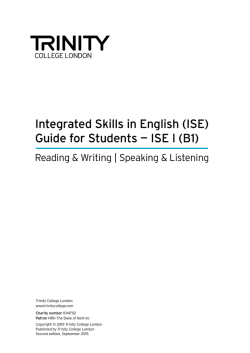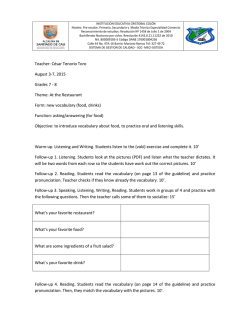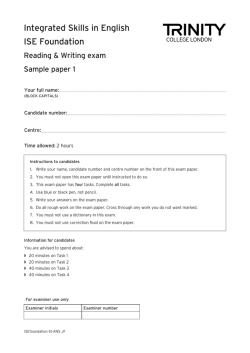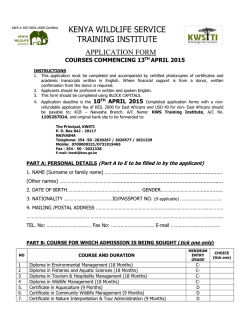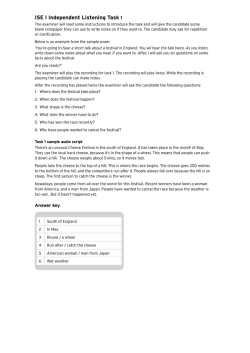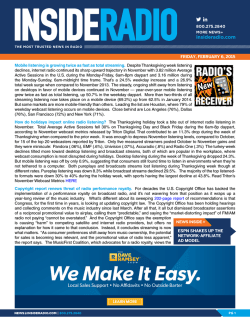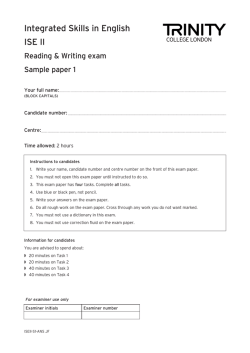
Guide for Students — ISE III
Integrated Skills in English (ISE) Guide for Students — ISE III (C1) Reading & Writing | Speaking & Listening Trinity College London www.trinitycollege.com Charity number 1014792 Patron HRH The Duke of Kent KG Copyright © 2015 Trinity College London Published by Trinity College London Second edition, September 2015 Foreword Trinity’s Integrated Skills in English (ISE) exams assess all four language skills — reading, writing, speaking and listening — in a way that reflects real-life communication in English. This guide: ◗◗ gives a summary of both modules of the ISE III exam — Reading & Writing and Speaking & Listening ◗◗ gives you some ideas on how to prepare for the ISE III exam ◗◗ tells you what the examiner is looking for ◗◗ tells you about results and certificates. 2 Contents Contents What is ISE III? 4 ISE III summary 6 Reading & Writing 6 Speaking & Listening 7 How to prepare for ISE III 9 Reading & Writing Speaking & Listening What happens on the day of the exam? 9 10 11 Reading & Writing 11 Speaking & Listening 12 What is the examiner assessing in ISE III? 14 Reading 14 Writing 14 Speaking 15 Listening 15 Your ISE III qualification certificate 16 3 What is ISE III? What is ISE III? ISE III is an English language exam for learners of English who are at level C1 of the Common European Framework of Reference. You take ISE III in two parts — Reading & Writing and Speaking & Listening. Reading & Writing Speaking & Listening Who recognises ISE? Many institutions recognise ISE as proof that you can read, write, speak and listen in English. To find out more visit: www.trinitycollege.com/recognition 4 What is ISE III? What do I get when I pass a module? When you pass an ISE module, you get a module certificate: Sa m pl e Trinity College London Sa m pl e Trinity College London Module Certificate Module Certificate Yamuna Capra Yamuna Capra has achieved has achieved ISE III Reading & Writing Module ISE III Speaking & Listening Module CEFR Level C1 CEFR Level C1 This module is part of the Integrated Skills in English qualification This module is part of the Integrated Skills in English qualification Reading - Distinction Writing - Distinction Speaking - Merit Listening - Distinction Saffron English Centre - October 2015 Certificate issued 21 October 2015 Saffron English Centre - September 2015 Certificate issued 27 September 2015 Trinity ID: 1-12345678:1-1234567899 Candidate number: 1-123456789 Trinity ID: 1-12345678:1-1234567899 Candidate number: 1-123456789 Reading & Writing certificate Speaking & Listening certificate When do I receive the ISE III qualification certificate? After you have passed both ISE III Reading & Writing and ISE III Speaking & Listening, you receive the ISE III qualification certificate, which shows your results in all four skills. Sa m pl e Trinity College London Yamuna Capra is awarded ISE III Integrated Skills in English CEFR Level C1 Level 2 Certificate in ESOL International* Reading Writing Speaking Listening Distinction Distinction Merit Distinction October 2015 October 2015 September 2015 September 2015 Certificate issued 21 October 2015 Sarah Kemp Chief Executive, Trinity College London Patron HRH The Duke of Kent KG ID type: Passport ID number: 2608197477 Nationality: Italy * Level refers to the National Qualifications Framework in England, Wales and Northern Ireland Qualification number: 601/5517/6 Trinity ID: 1-12345678:1-1234567899 Candidate number: 1-123456789 ISE qualification certificate 5 ISE III summary ISE III summary Reading & Writing How long is the Reading & Writing exam? Two hours. Which skills do the reading tasks test? Reading for gist, reading for details, reading comprehension, understanding the main ideas of a text and inferring. Which skills do the writing tasks test? How you organise a text, your range of language functions, grammar and vocabulary, how well you answer the question, and how you transform reading texts into a writing text. The Reading & Writing exam has four parts: Task 1 — Long reading How many texts? One text. How long is the text? About 700 words. How many questions? 15 questions. There are three types of question: ◗◗ questions 1–5 — choose the right heading for each paragraph of the reading text ◗◗ questions 6–10 — decide which five statements from a list of eight are true according to the text — three are false or not stated in the text ◗◗ questions 11–15 — complete sentences with words from the reading text. Task 2 — Multi-text reading How many texts? Four short texts. How long are the texts? In total, the four texts are about 700 words. One of the texts is an infographic. How many questions? There are 15 questions. There are three types of questions: ◗◗ questions 16–20 — choose which text matches a description — there are five questions which describe the main idea or purpose of the texts ◗◗ questions 21–25 — decide which five statements from a list of eight are true according to the texts — three are false or not stated in the texts ◗◗ questions 26–30 — complete summary notes with words from the texts — the notes are a summary of the four texts. Task 3 — Reading into writing How many texts do I read? You use the four texts from task 2. What do I write? An essay or article. How many words do I write? 200–230 words. You can only use information from the texts in task 2 in your answer. Your answer must be in your own words and not copied from the texts. Task 4 — Extended writing What do I write? An essay, article or report in response to a question. How many words do I write? 200–230 words. To see sample Reading & Writing exams, please go to: www.trinitycollege.com/ISEIII 6 ISE III summary Speaking & Listening The Speaking & Listening exam is a one-to-one interview with a Trinity examiner. The exam is in four parts: ISE Speaking & Listening exam Topic task Collaborative task Conversation task (8 minutes) (4 minutes) (3 minutes) Independent listening task (8 minutes) Topic task (8 minutes) Topic presentation (4 minutes) Before the exam you prepare to give a formal presentation on a topic. You can choose what you want to talk about. You must prepare a handout for the examiner. You can use visual aids if you want to. Topic discussion (4 minutes) After your presentation, start the discussion by asking the examiner if he or she has any questions or comments on points you raised in your presentation. The examiner makes notes during your presentation and may ask you to expand upon points you made, clarify information, defend your opinions or consider alternatives. You can bring some notes with you to the exam. During the exam, you discuss your topic with the examiner. Remember to plan your topic both as a presentation and as a discussion, thinking of questions that you can ask the examiner and also questions that the examiner might ask you. 7 ISE III summary Collaborative task (4 minutes) 1. The examiner reads a short prompt. The prompt has some information about a situation or opinion. You need to listen carefully to what the examiner says. 2. When the examiner finishes reading the prompt, he or she stops talking. It’s then your responsibility to start the conversation. Try asking the examiner for more information or details and then respond to what he or she says. 3. For the rest of the task, it’s your responsibility to keep the conversation going by adding to the conversation, encouraging the examiner to tell you more information, and responding to what the examiner says. Remember, it’s a discussion and it’s your role to collaborate with the examiner, working together to build the conversation. But if you say nothing, the examiner says nothing. Conversation task (3 minutes) In this part of the exam, you and the examiner have a conversation on one of these subjects. IndependenceAmbitions Stereotypes Role models Competitiveness Young people’s rights The media Advertising Lifestyles The arts The rights of the individual Economic issues Think about each subject. What can you say about each one? Try to talk about your ideas, opinions, plans and personal experiences. Independent listening task (8 minutes) In this part of the exam there is one task. You listen to a recording twice. After the first time you tell the examiner in one or two sentences what the talk is about. You listen again and take some notes if you want to. Then you respond to the examiner’s instructions. For example, listen for and report the general gist of the speaker’s argument. Listen for what arguments are given for a particular opinion, or for the advantages and disadvantages of a situation or proposal. ... ? Listen to a recording (twice) The examiner gives you some instructions You report the relevant information To watch a video of an ISE III Speaking & Listening exam, please go to: www.trinitycollege.com/ISEIII 8 How to prepare for ISE III How to prepare for ISE III Below are some tips for preparing for each part of the ISE III exam: Reading & Writing Reading Do ◗◗ Practise reading lots of different types and lengths of text in English by, for example, reading English websites, newspapers or magazines — look for subjects in English that interest you and subjects that you are studying in school or college. ◗◗ Practise checking references, eg in academic journals, and reading different styles of text, eg formal, academic, neutral. ◗◗ Try to understand the meaning of words you don’t know. Look at the whole sentence, the paragraph and the context and try to think of possible meanings of the word. After you finish reading the paragraph or the whole text, check the meanings of the words in the dictionary. Writing Do ◗◗ Look at the question carefully (How many different ideas are there in the question? How many ideas do you have to write in your answer?). ◗◗ Practise writing in a three-stage process: – plan what you want to write – write your answer – check what you have written. ◗◗ Check your work to see if it is: – organised (Have you used paragraphs? Does it have a conclusion? Are your ideas logically linked? Are your ideas clearly expressed? Does each paragraph express a different point?) – appropriate (Have you answered the question? Have you thought about who will read your writing?) – accurate (Is your spelling correct? Have you used capital letters and full stops?). ◗◗ Practise doing sample exams from the Trinity website www.trinitycollege.com/ISEIII ◗◗ Practise writing in English outside study time — for example, write a journal of your ideas and plans, write your opinions on news items and current affairs, write reviews of films you have seen or books you have read, take part in discussions on the internet in English, and write emails or messages to friends in English. 9 How to prepare for ISE III Speaking & Listening Topic task Do ◗◗ Spend time choosing and preparing your topic. Choose a topic that interests you and that you can spend up to four minutes talking about. ◗◗ Try to think of a topic that includes lots of language of ISE III. For example, a topic in which you can develop and justify an argument, evaluate opinions, speculate and summarise. ◗◗ Use a range of different language functions from the level (see page 14). ◗◗ Think of the language you need and the questions the examiner might ask you. ◗◗ Give the examiner some notes to accompany your topic presentation. ◗◗ Make sure your topic is discursive — there should be more than one point of view and you need to highlight the differences between them. ◗◗ Invite the examiner to ask questions at the end of your topic presentation. ◗◗ Think of questions to ask the examiner. ◗◗ Practise listening to English as well as speaking it — you are tested on your interactive listening skills (how well you follow the conversation), so practise having conversations in English. Collaborative task Do ◗◗ Practise with a friend or colleague. ◗◗ Practise asking another person about a problem, a situation that has happened, or a problem or situation that might happen in the future. Also, try asking them about their opinion on a problem or situation. Ask them for more information and try to work with them to discuss the situation. ◗◗ Practise listening to English as well as speaking it — you are tested on your interactive listening skills (how well you follow the conversation), so practise having conversations in English. Don’t ◗◗ Don’t talk about yourself — the Collaborative task is about the situation, not your own situation. Conversation task Do ◗◗ Be prepared to talk about all the conversation subject areas. ◗◗ Think about what questions the examiner might ask about the different conversation subject areas. ◗◗ Think about how you can use the language of ISE III to talk about the different conversation subject areas. ◗◗ Think of questions to ask the examiner. ◗◗ Practise listening to English as well as speaking it — you are tested on your interactive listening skills (how well you follow the conversation), so practise having conversations in English. Independent listening task Do ◗◗ Practise listening to recorded English — you are also tested on listening to recordings, so watch films and television in English, listen to English podcasts or news programmes, watch English videos on the internet and practise in study time. ◗◗ Practise taking notes while you listen — try to only write the most important information like key opinions, arguments and facts. ◗◗ Listen to discussions and speeches where the content is more likely to be abstract and attitudes implied rather than purely informational. Don’t ◗◗ Don’t try to write down everything you hear — you don’t need 100% of the information. 10 What happens on the day of the exam? What happens on the day of the exam? Reading & Writing You take the exam at a Trinity centre or at a registered exam centre. It is a written exam and it takes two hours. Here is the format of the exam and some tips on each part. Task 1 — Long reading ◗◗ Read the questions carefully. ◗◗ Write your answers on the exam paper. ◗◗ Spend about 20 minutes on this task. ◗◗ Make sure you leave enough time to do all the other tasks in the exam. Tip If you make a mistake, cross out your answer and write a new answer next to it. Task 2 — Multi-text reading ◗◗ Read the questions carefully. ◗◗ Write your answers on the exam paper. ◗◗ Spend about 20 minutes on this task and make sure you leave enough time to do all the other tasks in the exam. Task 3 — Reading into writing ◗◗ Read the task carefully. ◗◗ Plan your answer before you write — your plan is not marked. ◗◗ Make sure you answer all the points in the question. ◗◗ Make sure you use information from the texts in task 2 to answer the question. ◗◗ Check your work when you have finished. ◗◗ Spend about 40 minutes on this task. Tip Don’t just copy from the texts — always try to use your own words. Task 4 — Extended writing ◗◗ Read the task carefully. ◗◗ Plan your answer before you write — your plan is not marked. ◗◗ Make sure you answer all the points in the question. ◗◗ Check your work when you have finished. ◗◗ Spend about 40 minutes on this task. 11 What happens on the day of the exam? Speaking & Listening A Trinity examiner comes to your centre for the Speaking & Listening module. This is what happens: Introductions ◗◗ The examiner says ‘Hello’ and asks your name. The examiner uses some simple greetings like ‘How are you?’. ◗◗ The examiner asks to see your identification. ◗◗ You are not tested during the introductions part of the exam. Tip It is natural to be nervous when taking an exam — but try to think of the Speaking & Listening exam as an opportunity to talk about things that interest you. It’s a chance to show the examiner what you can do in English. If you don’t understand something, it’s fine to ask the examiner to repeat what he or she said. Topic task Topic presentation — The examiner asks you to begin your presentation. You have four minutes to give your presentation including any time it takes you to set up. Make sure you are confident in setting up any visual aids you have prepared so that it doesn’t take too much time. You aren’t allowed extra time to set up any equipment. Practise your presentation and time yourself to make sure that you can say all you plan to. At the end of your presentation you need to start the discussion. Topic discussion — To start the discussion ask the examiner if he or she has any questions. The examiner uses the notes he or she made during your presentation to discuss your topic with you. Be prepared to defend your arguments, negotiate points, hypothesise about alternative ideas or possible outcomes, develop your arguments further or summarise your thoughts. Collaborative task The examiner reads out a short prompt. You have to ask questions and keep the conversation going. Listen carefully to what the examiner says and make sure you understand the prompt. Respond to the prompt and ask questions, offer opinions and ask the examiner what he or she thinks. Don’t just talk about the subject but interact with the examiner about what he or she says. Build the conversation together. Conversation task The examiner tells you which subject you are going to talk about and then asks you a question or makes a comment to start the conversation. Listen to what the examiner says and respond appropriately. Remember, it’s a discussion. 12 What happens on the day of the exam? Independent listening task You listen to a recording twice. After the first time you tell the examiner in one or two sentences what the talk is about. You listen again and take some notes if you want to. Your notes are not assessed. Then you respond to the examiner’s instructions. For example, listen for and report the general gist of the speaker’s argument. Listen for what arguments are given for a particular opinion, or for the advantages and disadvantages of a situation or proposal. End of the exam The examiner tells you that the exam has finished and says goodbye. You are not marked on this part of the exam. 13 What is the examiner assessing in ISE III? What is the examiner assessing in ISE III? Language functions for ISE III Study and practise the language functions before the exam. ◗◗ Initiating and maintaining the conversation ◗◗ Developing and justifying an argument ◗◗ Evaluating options, past actions/course of events and different statements ◗◗ Speculating ◗◗ Hypothesising ◗◗ Staging (ie a logical signposted structure) ◗◗ Summarising ◗◗ Indicating understanding of points made by the examiner ◗◗ Establishing common ground Reading There are 30 questions in the reading section. Depending on the number of correct answers you give, your Reading result will be Distinction, Merit, Pass or Fail. Writing Here are the four skills that the examiner assesses: Task fulfilment: How well you answer the question. Organisation and structure: How well you organise your writing, use paragraphs and sentences and link your ideas together. Language control: Your range and accuracy of vocabulary and grammar. How well you use punctuation and your spelling. Reading for writing (task 3 only): How well you use the reading texts from task 2 to write answers using your own words in task 3. For the writing tasks, your scores in the four scales are combined. Your Writing result will be Distinction, Merit, Pass or Fail. Reading result: Distinction Merit Pass Fail Writing result: Reading & Writing module result: + Distinction Merit Pass = Pass + Fail = Fail If you pass the reading part and the writing part, you will pass the Reading & Writing module. If you fail either the reading part or the writing part, or both, you will not pass the Reading & Writing module. 14 What is the examiner assessing in ISE III? Speaking The examiner assesses these four abilities: Communicative effectiveness: How well you complete each task. For example, discussing your topic or having a conversation. How well you respond to the examiner and how you cope with problems. For example, can you ask the examiner to repeat when you don’t understand. Interactive listening: How well you follow and build the conversation with the examiner. Language control: How good is the range and accuracy of the vocabulary and grammar that you use? For example, how well you use the language functions of ISE III (see page 14). Delivery: Can the examiner understand you? How good is your pronunciation and fluency? Your Speaking result will be Distinction, Merit, Pass or Fail. Listening In the Independent listening task the examiner awards a score based on how well you have understood the recording. Your speaking and writing are not assessed in the Independent listening task. Your Listening result will be Distinction, Merit, Pass or Fail. Listening result:* Speaking result: Distinction Merit Pass Fail Speaking & Listening module result: + Distinction Merit Pass = Pass + Fail = Fail If you pass the speaking part and the listening part (the Independent listening task), you will pass the Speaking & Listening module. If you fail either the speaking part or the listening part, or both, you will not pass the Speaking & Listening module. *Independent listening task 15 Your ISE III qualification certificate Your ISE III qualification certificate When you pass both the Reading & Writing module and the Speaking & Listening module, you receive your ISE III qualification certificate. This certificate shows that you have passed ISE III and gives your results in reading, writing, speaking and listening. ISE III: Pass Reading: Pass or Merit or Distinction Writing: Pass or Merit or Distinction Speaking: Pass or Merit or Distinction Listening: Pass or Merit or Distinction You also receive a report showing your strengths and areas for future improvement in each skill. You get this report if you pass or fail. 16
© Copyright 2026
